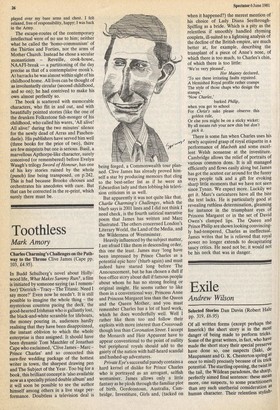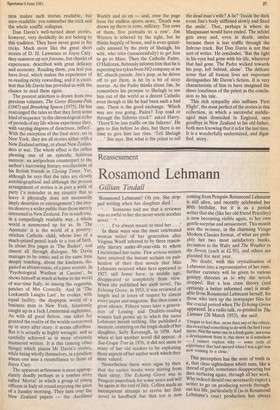Exile
Andrew Wilson
Selected Stories Dan Davin (Robert Hale pp. 319, £6.95) Of all written forms (except perhaps the limerick) the short story is in the most danger of being made to perform tricks. Some of the great writers, in fact, who have made the short story their special preserve have done so, one suspects (Saki, de Maupassant and G. K. Chesterton spring at once to mind) precisely because of its trick potential. The startling opening, the twist in the tail, the Wildean paradoxes, the shall), perfectly aimed final sentence: these mean more, one suspects, to some practitioners than any such unetherial consideration as human character. Their relentless stylish ness makes such stories readable, but unre-readable: you remember the trick and the whole soufflé collapses, Dan Davin's well-turned short stories, however, very decidedly do not belong to this tradition. They have never gone in for tricks. Much more like the great short stories of D. H. Lawrence or Joyce Cary, they summon up not frissons, but chunks of experience, described with great delicacy and economy. Reading them, you feel you have lived, which makes the experience of re-reading richly rewarding; and it is excellent that Mr Davin has provided us with the chance to read them again.
The present selection is drawn from two previous volumes, The Gorse Blooms .Pak (1947) and Breathing Spaces (1975). He has rearranged the tales so that they form some kind of sequence in the chronological order of periods of my life whose experience they, with varying degrees of directness, reflect'. With the exception of the final story, set in New York, they are all stories either with a New Zealand setting, or about New Zealanders at war. The whole effect is the rather pleasing one of an episodic fictitious memoir: an antipodean counterpart to the author's harrowing literary recollections of his British friends in Closing Times. Yet, although he says that the tales are closely autobiographical and although the present arrangement of stories is in part a work of piety Ca reminder to my country that to leave it physically does not necessarily imply desertion or estrangement') the stories deserve a wider public than those merely interested in New Zealand. For in each one, in a compellingly readable way, a whole world is summoned up for us. In 'The Apostate' it is the world of a povertystricken Catholic child, whose loss of a much-prized pencil leads to a loss of faith. In about five pages in 'The Basket', and almost all through dialogue, Mr Davin manages to be comic and at the same time deeply touching, about the kindness, disguised as abrasiveness, of a poor woman. In 'Psychological Warfare at Cassino', he shows himself as much at home in the world of war-time Italy, as among the vegetable patches of Mrs Connolly. And in 'The Locksmith Laughs Last', he evokes, with equal facility, the dyspeptic world of a business man in New York, hilariously caught up in a Jack Lemmonish nightmare. As with all good fiction, one takes for granted the reality of the worlds summoned up in story after story: it seems effortless. But it is actually as highly wrought, and as carefully achieved as in more obviously mannered writers. It is this (among other things) which places Mr Davin's stories, while being wholly themselves, in a position where one sees a resemblance to those of Joyce Cary.
The apparent artlessness is most appropriately deadly perhaps in a sombre story called 'Mortal' in which a group of young officers in Italy sit round enjoying the quiet of a Sunday morning. They turn over the New Zealand papers — the Auckland Weekly and so on — and, over the page from the endless sports news, 'Death was drawn up there in rows, military. Ten rows of them, five portraits to a row'. Jim Winters is sobered by the sight, but he thinks happily of home, and is even quizzically amused by the piety of Shelagh, his wife, who tries (unsuccessfully) to get him to go to Mass. Then the Catholic Padre, O'Halloran, furiously informs him that he is expecting ten tykes from HQ company at an RC church parade. Jim's jeep, as he drives off to get them, is hit by a bit of stray mortar. As the Padre thinks about Jim, he remembers his promise to Shelagh to see him out of the world as a decent Catholic even though in life he had been such a bad one. There is the good exchange: 'Which way are you going, Padre? Top road or through the Inferno track?' asked Harry. 'There'll be less traffic on the Inferno'. He gets to Jim before he dies, but there is no time to give him last rites. 'Tell Shelagh . . .' Jim says. But what is the priest to tell the dead man's wife? A lie? 'Inside the dark room Jim's body stiffened slowly and fixed the smile'. That, perhaps is where de Maupassant would have ended. The infidel gets away and, even in death, smiles because there is less traffic through the Inferno track. But Dan Davin is not that sort of writer. He concludes, 'But the light in his eyes had gone with his life, wherever that had gone. The Padre walked towards his jeep, left behind, alone'. The delicate sense that all human lives are important distinguishes Mr Davin's fiction. It is very characteristic of him to have imagined the sheer loneliness of the priest as the conclusion to his tale.
This rich sympathy also suffuses 'First Flight', the most perfect of the stories in this collection, in which a successful middleaged man domiciled in England, says goodbye in New Zealand to his old father, both men knowing that it is for the last time. It is a wonderfully understated, and dignified story.











































 Previous page
Previous page